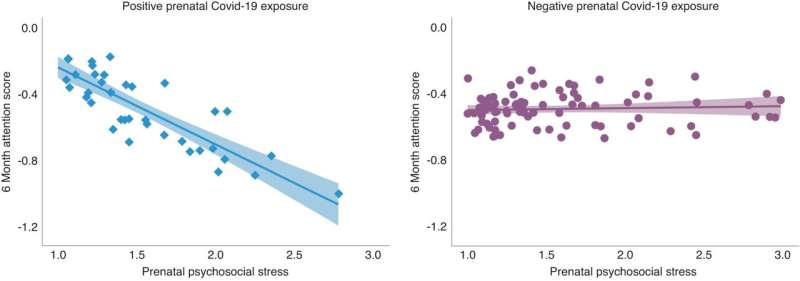This article has been reviewed according to Science X's editorial process and policies. Editors have highlighted the following attributes while ensuring the content's credibility:
fact-checked
peer-reviewed publication
trusted source
proofread
Combined, high maternal stress and prenatal COVID-19 infection may affect attention span in infants

For mothers who experience high stress during their pregnancy, prenatal COVID-19 infection may be associated with an increased risk for impaired attention and delayed socioemotional and cognitive functioning in their infants, according to a small study published in Pediatric Research.
The findings highlight maternal stress as a modifiable target to potentially reduce negative outcomes from prenatal COVID-19 infection and the possible protective benefits to expectant mothers of getting vaccinated for COVID-19 during their pregnancy.
The study was led by Denise Werchan, Ph.D., Moriah Thomason, Ph.D., and Natalie Brito, Ph.D., at New York University, New York. It included 167 mothers and their infants—50 who reported COVID-19 symptoms or a positive COVID-19 test during their pregnancy and 117 who did not report having COVID-19 while pregnant. The researchers enrolled families between March 2020 and January 2023, with most enrolled between March and August 2020.
Mothers reported on depression, anxiety, and post-traumatic stress symptoms and physical complaints during their pregnancy, which were then averaged into an overall score of prenatal psychosocial stress. Infant development at 6 months was assessed using a behavioral task and self-report measure, in which researchers remotely led families through a visual eye gaze task to measure infant attention and mothers filled out a survey of infant self-regulation. When infants were 12 months old, 99 participating mothers completed surveys to identify possible delays in their child's socioemotional and cognitive development.
Independently, prenatal stress and COVID-19 infection were not related to infant outcomes at either age. In pregnancies without COVID-19, no association was found between prenatal stress and infant attention at 6 months. However, in pregnancies positive for COVID-19, higher prenatal stress was associated with poorer infant attention. In turn, infants with poorer attention at 6 months were more likely to show possible delays in socioemotional functioning and cognition at 12 months.
The researchers are continuing follow this cohort of children into later ages to examine if the impact of maternal stress on their neurobehavioral development persists, as reflected by parental report, biospecimens, behavioral assessment, and neuroimaging.
More information: Denise M. Werchan et al, Effects of prenatal psychosocial stress and COVID-19 infection on infant attention and socioemotional development, Pediatric Research (2023). DOI: 10.1038/s41390-023-02807-8



















